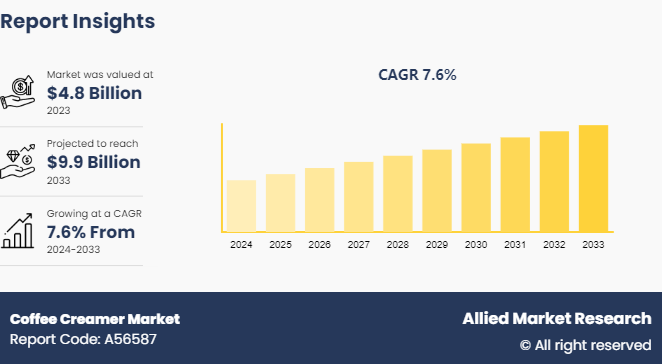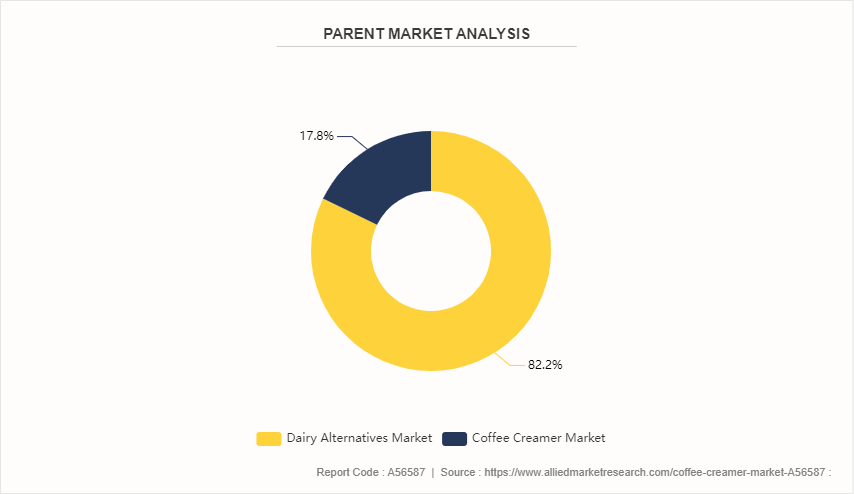Coffee Creamer Market Research, 2033
Market Introduction and Definition
The global coffee creamer market size was valued at $4.8 billion in 2023, and is projected to reach $9.9 billion by 2033, growing at a CAGR of 7.6% from 2024 to 2033.
The coffee creamers market includes both dairy-based and non-dairy products that are meant to improve the taste and texture of coffee. Coffee creamers come in a range of forms to suit different consumer tastes, such as liquid, powder, and concentrated versions. These products are designed to meet certain dietary requirements; they are available in a variety of tastes and plant-based, sugar-free, and lactose-free versions. The market is driven by rising coffee consumption, rising convenience product demand, and consumers' growing health consciousness. Coffee creamers have become an important sector in the global beverage industry due to innovations in tastes and formulas that further stimulate market expansion.

Key Takeaways
- The coffee creamer’s market study covers 20 countries. The research includes a segment analysis of each country in terms of value for the projected period.
- More than 1, 500 product literature, industry releases, annual reports, and other such documents of major coffee creamer industry participants along with authentic industry journals, trade associations' releases, and government websites have been reviewed for generating high-value industry insights.
- The study integrated high-quality data, professional opinions and analysis, and critical independent perspectives. The research approach is intended to provide a balanced view of global markets and to assist stakeholders in making educated decisions in order to achieve their most ambitious growth objectives.
Key market dynamics
Rise in coffee consumption around the globe has increased the market for coffee creamers or coffee whitener as a supplemental product. The coffee creamers market is being further propelled by the development of coffee shops and cafés that have resulted from the rise of coffee culture, especially in urban areas. Ready-to-use coffee creamers are in high demand due to shifting customer tastes for convenience products and beverages.
In addition, manufacturers constantly introduce new flavors and forms to accommodate a wide range of consumer tastes, and innovation plays a crucial role in market dynamics. The creation of non-dairy, low-fat, and sugar-free creamers has expanded the market base due to the trend toward health consciousness. Plant-based coffee creamers including almond, soy, and oat creamers are in high demand due to the expanding vegan community and consumers who are lactose intolerant.
Furthermore, the coffee creamer market is heavily influenced by marketing and branding efforts. Companies spend a lot of money on promotions and advertising to attract consumers. Single-serve pods and portable sachets are two examples of packaging innovations that have increased convenience and fueled market expansion. Moreover, coffee creamers are now easier to get owing to the growing acceptance of e-commerce platforms, which has increased sales.
North America and Europe markets are witnessing growth owing to high rates of coffee consumption and the existence of prominent brands of coffee creamers. However, due to factors such as urbanization, increase in disposable incomes, and increase in coffee enthusiasts, the Asia-Pacific region is starting to show promise as a profitable market.
However, market expansion is hampered by economic factors including changes in the price of raw materials and interruptions in the supply chain. Furthermore, market dynamics are impacted by governmental restrictions on food safety and labeling. However, innovation, consumer preferences, and smart marketing initiatives are fueling the coffee creamer market growth and placing it as a dynamic and changing sector of the broader food and beverage industry.
Parent Market Overview of the Global Coffee Creamer Market
The global coffee creamer market is a significant segment within the broader dairy alternatives market. This parent market includes a broad spectrum of products made to fit different dietary needs and preferences and act as alternatives for traditional dairy products. Growing numbers of people are becoming vegan, consumers are becoming more health conscious, and lactose intolerance is on the rise. This industry is further propelled by advancements in flavor, formulation, and packaging, in addition to the convenience trend. The development of e-commerce and retail channels has also improved product accessibility, which has fueled market expansion. Rapid innovation and diversification, which reflect changing consumer tastes and nutritional trends, define the non-dairy and dairy substitutes sector.

Market Segmentation
The coffee creamer market is segmented into product, type, form, and region. On the basis of product, the market is divided into dairy-based and non-dairy. On the basis of type, the market is divided into high-fat, low-fat, and fat-free. On the basis of form, the market is bifurcated into liquid and powders. Region-wise, the coffee creamers market share is analyzed across North America, Europe, Asia-Pacific, and LAMEA.
Regional/Country Market Outlook
The market in North America is fueled by high coffee consumption in the region as well as the expanding need for creative and practical coffee products. The U.S. dominates the North America market, as customers become more health-conscious and choose plant-based, low-sugar creamers. Prominent companies such as Nestlé and Danone consistently introduce novel flavors and formulations to accommodate a wide range of consumer preferences.
The robust coffee culture in Europe is helping to drive the market's steady growth for coffee creamers. In terms of coffee creamers market size and growth, the UK, Germany, and France are in the lead. Non-dairy creamers are becoming more popular as plant-based diets and lactose-free products gain traction. Companies are concentrating on organic and clean-label ingredients to cater to health-conscious consumers. Furthermore, environmentally friendly packaging is growing in popularity in line with consumers' growing concern for the environment.
The market for coffee creamers is expanding quickly in the Asia-Pacific region due to the growing acceptance of Western lifestyles and coffee culture during coffee creamer market forecast. Leading nations in this expansion are South Korea, Japan, and China. Urbanization and growing disposable income are driving more coffee consumption, which in turn is driving up demand for creamers. The market in this region is distinguished by a strong desire for both innovative plant-based substitutes and conventional dairy creamers. In addition, companies are spending money on regionalizing cuisines to suit consumer preferences.
Brazil and Mexico are two important markets for coffee creamers in Latin America. The market is expanding due to the region's strong coffee culture and growing taste for flavored creamers. Despite being developing markets, the Middle East and Africa are showing promise due to rising urbanization and the growing impact of Western coffee patterns. The market is slowly growing in these areas, with a noticeable trend toward flavored and non-dairy creamers. As a result, the coffee creamer market is characterized by innovation, with companies concentrating on environmentally friendly, plant-based, and health-conscious products to satisfy shifting customer needs in various regions.
Coffee Creamers Industry Trends:
- Under the Coffee-Mate brand, Nestlé launched a new range of plant-based coffee creamers in June 2024. Almond milk and oat milk-based creamers are among the products being introduced to expand the vegan and lactose-sensitive consumer base. The product range also includes reduced-sugar options to satisfy customers who are concerned about their health.
- Danone launched a new range of soy and almond milk-based dairy-free creamers in China in April 2024. This development is a response to Chinese consumers' growing knowledge of lactose intolerance and the growing trend of plant-based diets.
- Oatly introduced its oat-based coffee creamers to the Japanese market in May 2024. This launch satisfies the growing demand in the Japanese market for healthier and ecologically responsible options while also following the growing trend of plant-based alternatives.
Competitive Landscape
The major players operating in the coffee creamer market share include Nestlé S.A., Danone, Chobani LLC, DreamPak LLC, Viceroy Holland B.V., PT Santos Premium Krimer, Kerry Group, FrieslandCampina, Land O'Lakes, Inc., Fujian Jumbo Grand Food Co., Ltd., Heartland Food Products Group, Leaner Creamer LLC, Califia Farms, LLC, nutPods, and Laird Superfood.
Recent Key Strategies and Developments
- In January 2023, Danone introduced plant-based almond and coconut coffee creamers under the Silk and So Delicious brands.
- In January 2022, Chobani LLC introduced new coffee creamers made of plant protein. There are four kinds of creamers, namely, French vanilla, chocolate hazelnut, caramel macchiato, and sweet & creamy.
Key Benefits For Stakeholders
- This report provides a quantitative analysis of the market segments, current trends, estimations, and dynamics of the coffee creamer market analysis from 2024 to 2033 to identify the prevailing coffee creamer market opportunities.
- The market research is offered along with information related to key drivers, restraints, and opportunities.
- Porter's five forces analysis highlights the potency of buyers and suppliers to enable stakeholders make profit-oriented business decisions and strengthen their supplier-buyer network.
- In-depth analysis of the coffee creamer market segmentation assists to determine the prevailing market opportunities.
- Major countries in each region are mapped according to their revenue contribution to the global market.
- Market player positioning facilitates benchmarking and provides a clear understanding of the present position of the market players.
- The report includes the analysis of the regional as well as global coffee creamer market trends, key players, market segments, application areas, and market growth strategies.
Coffee Creamer Market Report Highlights
| Aspects | Details |
| Market Size By 2033 | USD 9.9 Billion |
| Growth Rate | CAGR of 7.6% |
| Forecast period | 2024 - 2033 |
| Report Pages | 250 |
| By Product |
|
| By Type |
|
| By Form |
|
| By Region |
|
| Key Market Players | land o'lakes, inc., DreamPak LLC, Chobani LLC, Nestle S.A., Fujian Jumbo Grand Food Co., Ltd, Danone, Frieslandcampina, Viceroy Holland B.V, Kerry Group, PT Santos Premium Krimer |
The global coffee creamer market is trending towards plant-based and organic options, reduced sugar content, and innovative flavors. Sustainability and clean-label ingredients are also gaining significant consumer interest.
The leading application of the coffee creamer market is in coffee and tea beverages, where it enhances flavor and texture, with both liquid and powdered creamers being widely used by consumers.
North America is the largest regional market for coffee creamer, driven by high consumer demand, extensive product availability, and significant market penetration of various flavored and non-dairy creamers.
The global coffee creamer market was valued at $4.8 billion in 2023, and is projected to reach $9.9 billion by 2033, growing at a CAGR of 7.6% from 2024 to 2033.
The major players operating in the coffee creamer market include Nestlé S.A., Danone, Chobani LLC, DreamPak LLC, Viceroy Holland B.V., PT Santos Premium Krimer, Kerry Group, FrieslandCampina, Land O'Lakes, Inc., Fujian Jumbo Grand Food Co., Ltd., Heartland Food Products Group, Leaner Creamer LLC, Califia Farms, LLC, nutPods, and Laird Superfood.
Loading Table Of Content...



